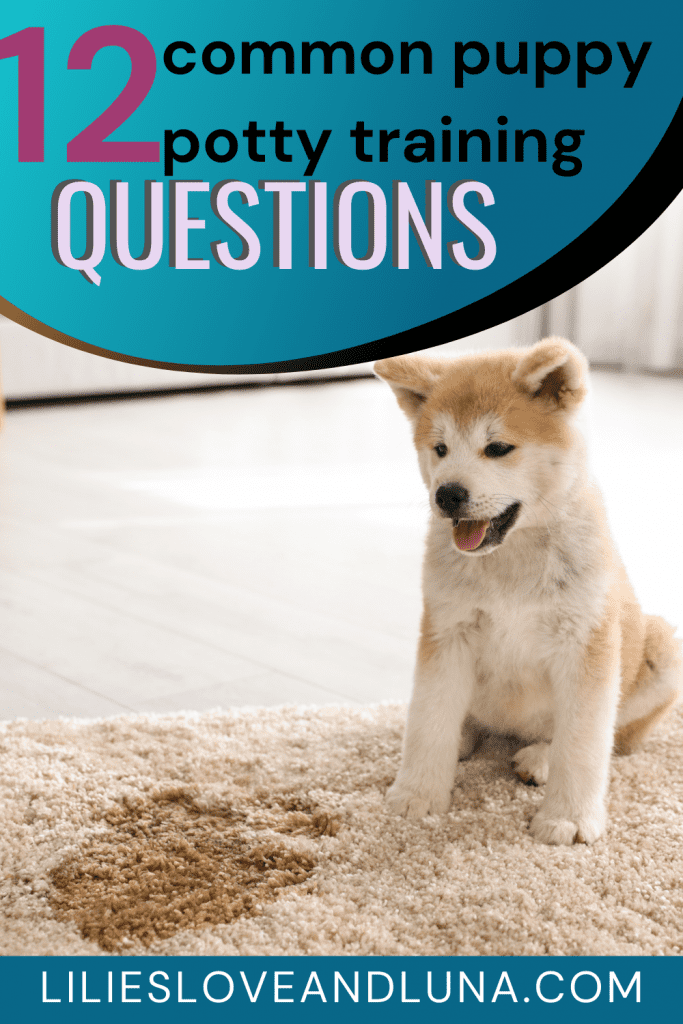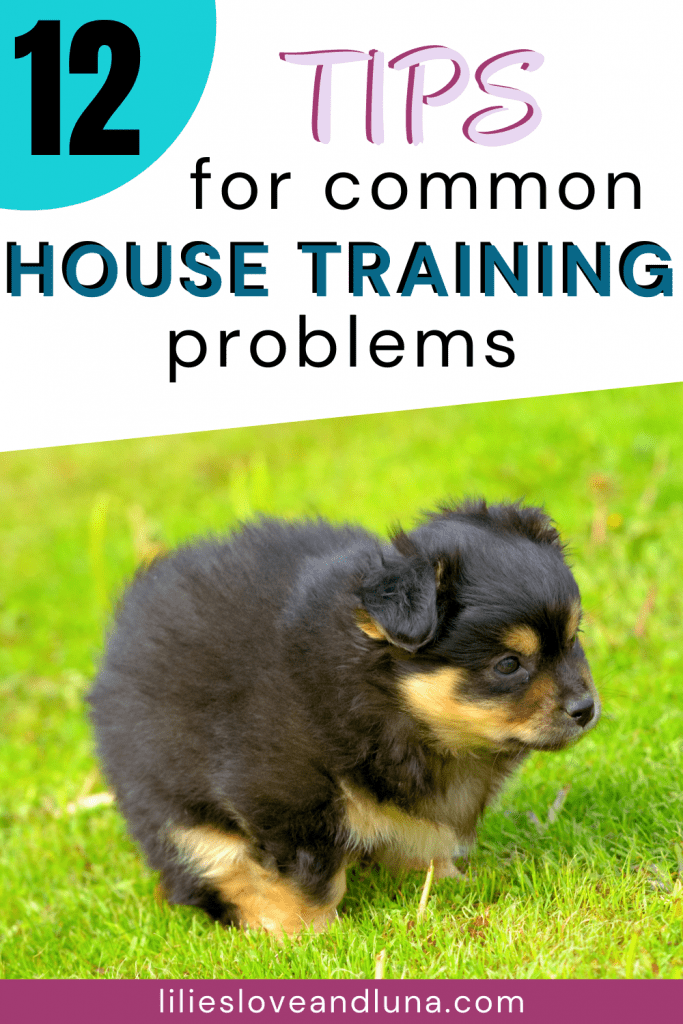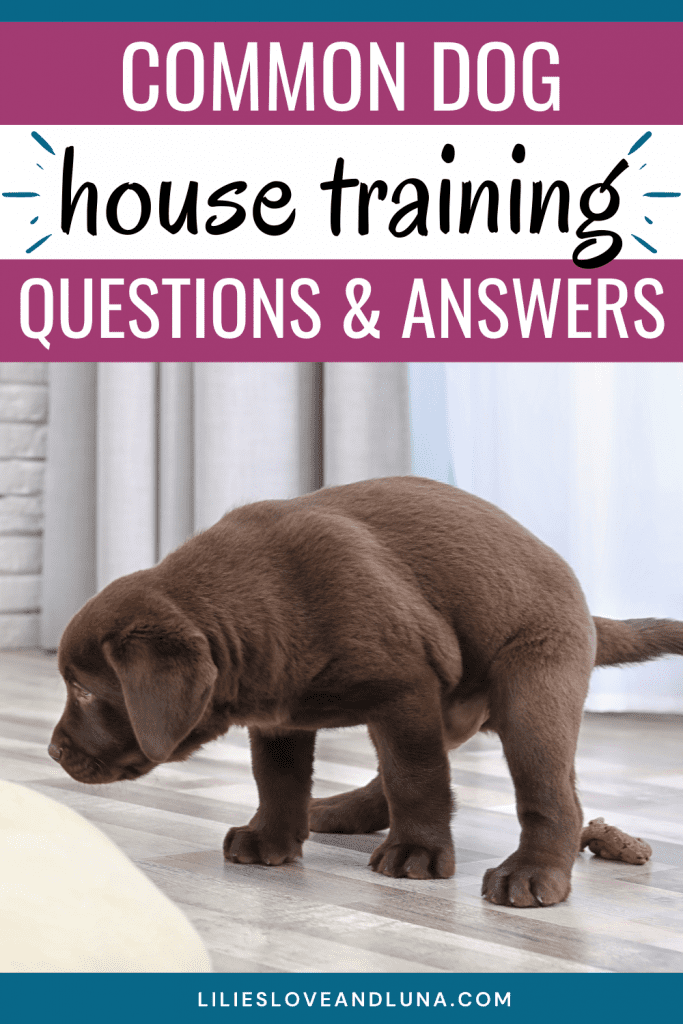Last Updated on April 6, 2023 by Shannon
House training our dogs was one of the hardest, and among the most important things, families with dogs will ever have to do.
Along with the common advice of sticking to a routine, there are many issues that can come up while house training a dog. Some of the issues we came across were how to keep our new puppy from peeing in her kennel, refusing to poop outside, and having accidents in the house.
Along with the issues we had with potty training Luna, there are several other common questions about potty training a puppy.
Read on to find the answers to some of the most common puppy potty training questions I’ve come across (and had myself).
This post may contain affiliate links. That means if you click on them and buy something, I may receive a small commission at no cost to you. Read my Disclaimer Policy to learn more.
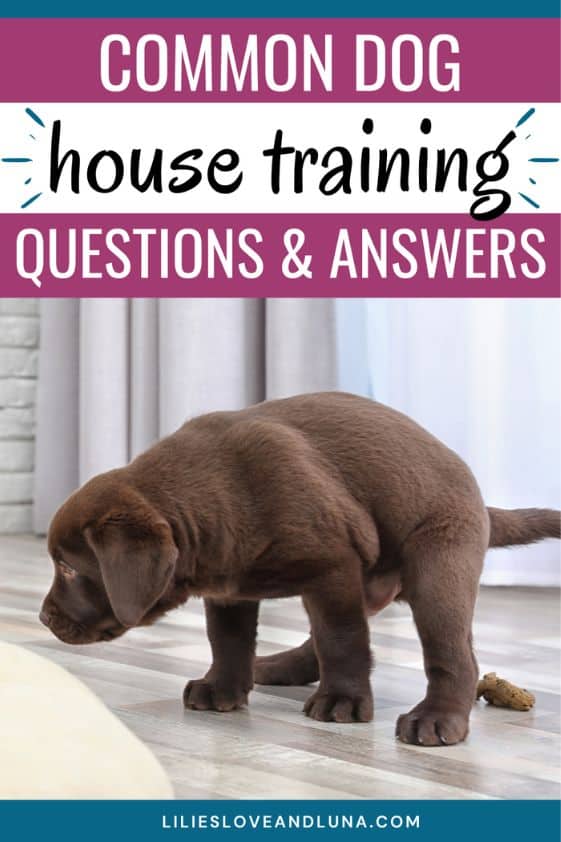
What is the best age to potty train a puppy?
The best age to start potty training a puppy is around 8 weeks old. At this age, puppies are starting to become more aware of their surroundings and have generally good control over their bladder and bowel movements.
Of course, every puppy is different and some may be ready earlier or a little later to start potty training. No matter when you start, it will take time to get your puppy fully potty trained.
The most important thing is to start when they come home and to be consistent with your training.
How long can a puppy hold its bladder during the day?
The number of hours a puppy can hold their bladder during the day will depend on their age. Depending on where you look, some sources, like the Humane Society of the United States, say puppies can hold it for 1 hour per month of age and others, like Bedford Highway Veterinary Hospital, say one hour per month of age plus one.
So, going with the first one, an 8-week-old puppy should be able to hold it for 2 hours, an 8-month-old puppy for 8 hours, and so on.
And according to the second one, 8-week-old puppy should be able to hold it for 3 hours, and by 7 months a puppy would be able to hold it for 8 hours.
Personally, I chose to go with the shorter time. I figured it’s better to take a puppy out more often than needed, than to wait too long.
How long can a dog hold its bladder overnight?
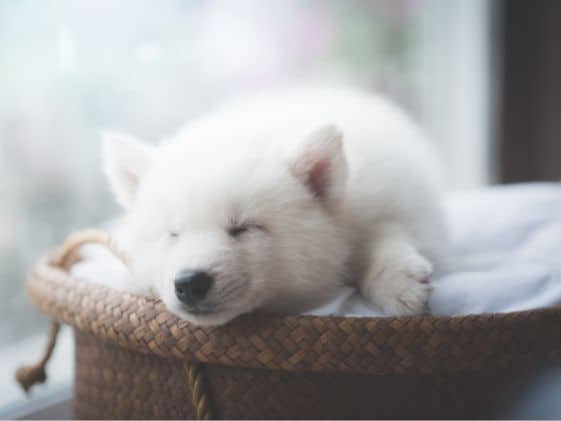
Even though puppies can only hold their bladder about one hour per month of age during the day, many can hold it longer when they are sleeping.
Even though they may be able to hold it longer while asleep, once they are awake, they will need to go right away. It’s best to plan on taking a young puppy out at least once or twice a night for the first few weeks.
Then as the puppy gets a little older, and you get to know their habits, you can slowly decrease the nighttime trips outside.
There is no set age as to when a puppy will be able to hold it all night. Some are able to do this at a really young age, and others take a while longer.
I lucked out with Luna, she came home with us at about 9 1/2 weeks old and slept through the night from the get-go. Morgan, on the other hand, had a few weeks of midnight trips outside to potty.
Follow your puppy’s cues on the nightly trips outside and remember, this stage doesn’t last very long.
How long does it take for a dog to poop after eating?
This can vary by dog, but the general belief is that most dogs will need to poop about 20-30 minutes after eating a meal, though it can vary as much as 5 minutes after they eat to up to an hour.
If you want to know how long it takes for your dog, keep track for a few days and you should have a good idea of when they will need to poop each day.
How long can a dog hold its poop?
A dog can usually hold their poop for about as long as they can hold their bladder. The general rule is 1 hour per month of age, but some dogs will be able to hold it a little longer than that while others may need to go more frequently.
A healthy adult dog should be able to hold it as long as 8 to 12 hours, but it’s not recommended to make them hold it for more than 8 hours.
If you make your dog hold it longer than they can, they will eventually be forced to have an accident in the house.
My dog is 6 months old and not potty trained
If you have been consistently working on getting your dog potty trained and they are still having accidents at 6 months old, it’s time to take them to the vet. It’s possible there is a health issue causing them to have accidents in the house.
If your vet says your dog is healthy, it’s time to consider how you have been potty training your dog. Have you been consistent? Do you clean up the mess with an enzyme cleaner?
Go back to the beginning and start the potty training process over again. Take your dog out frequently and limit their access to the house when unsupervised. With consistent work and supervision, you should be able to get your 6-month-old dog potty trained.
You also have one advantage in training that younger puppies don’t have. A 6-month-old dog can, physically, hold their bladder much longer than an 8-week-old puppy. Once you get the behavior corrected, the accidents should stop.
Why does my puppy poop in the house?
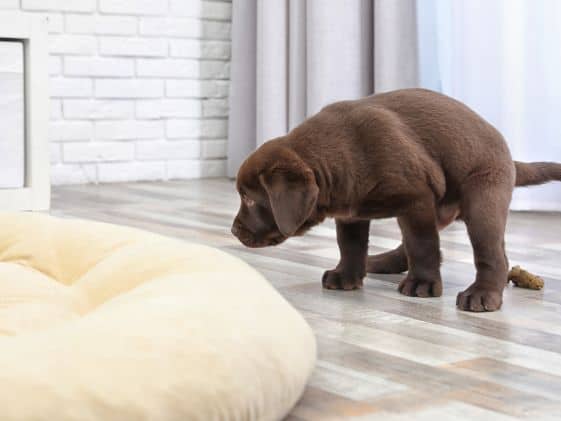
There are several reasons puppies may poop in the house.
Haven’t been trained
The most common reason is that they simply haven’t been taught not to yet. Puppies need to be taken out frequently, at least every couple of hours, and given the opportunity to poop.
Can smell it
Another common reason is that your puppy is pooping where he smells his poop from before. If you aren’t getting the poop cleaned up good enough (dogs have a REALLY strong sense of smell), they may decide to poop where they smell it from before.
Use a good enzyme cleaner for cleaning up the mess to discourage pooping where they pooped before.
Diarrhea
If your dog is pooping in the house and it looks like it may be diarrhea, loose and watery looking, call the vet first, before trying any of the other suggestions. Diarrhea in puppies can lead to dehydration quickly and should be treated as soon as you can.
Why won’t my dog poop outside?
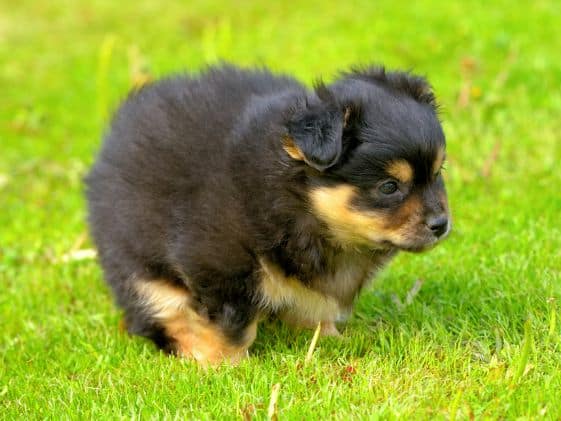
There are a few reasons your dog may not be pooping outside.
Not given enough time
The most common reason is that they are not being given enough time to poop.
If your dog only goes out for a quick walk around the block, they may not have enough time to poop. Try giving them a little more time outside or taking them on a longer walk.
Or try giving them some time to just sniff around while you stand in one spot. Maybe they are too interested in sniffing all the smells to poop. Once they have had a chance to sniff everything they may then go poop.
Pooping where the smell is
Dogs tend to poop near where they’ve pooped before becasue they can smell it. So they could be refusing to poop outside because they don’t smell it outside, they smell it inside.
The next time your dog has an accident inside, instead of getting rid of the poop, place it outside where you want your dog to poop. Then, when you think your dog needs to poop again, take them to where you placed the poop.
They should smell it and and hopefully decide that this place is a good place to poop.
Health issues
If the above don’t work, and you are sure you have been consistent in giving your puppy enough time to poop outside, it may be time to talk to your vet. They will be able to check your puppy out for any health issues that may be causing your puppy to not poop outside.
Why does my dog take so long to poop?
The amount of time that a dog needs to poop varies by dog. In addition to that, there are a couple of reasons why your dog may take a long time to poop.
Constipated
They may be constipated, which can be caused by a lack of fiber in their diet or not drinking enough water. If your dog takes longer than usual to poop, you should talk to your vet about possible causes and treatment options.
Picky on where to go
Another reason is that some dogs just want to take their time finding the right spot to poop. They may sniff around for a while before they finally go. This is normal behavior and nothing to worry about.
Morgan is a great believer in having to find the perfect spot to poop. She will do her poop dance just to decide that, no, this spot isn’t the right spot to poop. It can take her several minutes just to find the perfect spot to go.
Some dogs are just picky about where they want to go.
How do you stop a puppy from peeing and pooping in the house?
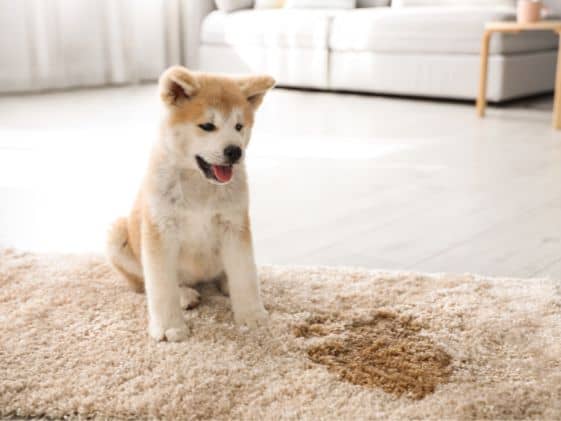
The only way to stop a puppy from peeing and pooping in the house is to get them properly potty trained and to be proactive during that training.
And remember, young puppies can’t hold their pee or poop very long. Set reasonable expectations and take your puppy out often enough that they don’t need to have an accident.
If you believe you are doing everything right, then it may be time to visit with a vet to make sure there isn’t a health reason that is causing your puppy to pee and poop inside.
How do I keep my new puppy from peeing in her kennel?
There are a few reasons why a puppy is peeing in their kennel.
Not going out enough
The first reason is that you aren’t taking them out often enough. Try reducing the amount of time between trips outside to potty. Also, make sure to take your puppy out to potty before putting them in their kennel.
Another reason is that the kennel is too large for your puppy. Puppies instinctively try to keep their “den,” or sleep area clean and won’t go potty or poop in that area if at all possible.
If the kennel is too large, they will be able to potty in one side of it and sleep in the other side. If this is the case, getting a smaller kennel, or if you have an adjustable kennel, making it smaller should help.
Puppies only need enough room to stand up, turn around, and lay down. Once they are fully potty trained, then you can give them more space.
Blanket or towel in the kennel

A third reason, one of the reasons Luna would potty in her kennel, is that you have something in the kennel that absorbs the pee. That then keeps the kennel “clean” enough for your puppy to be comfortable.
We tried giving Luna a towel to sleep on thinking she would prefer that over the hard plastic base of the kennel. The first night we tried it, she peed on it, and this was after several nights of her sleeping through the night with no issues.
We tried it one more time, in case we hadn’t given her enough time to go potty before bed, and she did it again. As soon as we stopped putting the towel in there, the accidents stopped.
Health reasons
The final, common, reason dogs pee in their kennels is that they have a bladder infection. Luna had this happen a little over a year after we got her. She went from no accidents all day, to having a wet kennel, both in the morning and in the afternoon.
A quick trip to the vet determined that she did, in fact, have a bladder infection and some antibiotics later, she was able to keep her kennel dry again.
If your dog suddenly starts peeing in their kennel, or having accidents in the house, when they haven’t for a long time, a trip to the vet is needed. The vet can test the urine for bacteria and check for other issues that could be causing it. With proper treatment, it should return to normal.
Why is my puppy having accidents in the house?
There are a few reasons why puppies have accidents in the house.
Not going out to potty often enough
The first reason is that they aren’t being taken out often enough. Puppies need to go potty frequently, as they can’t hold their bladder or bowels for very long. Try taking your puppy out more frequently, especially after naps and meals.
They aren’t potty trained yet
Another reason puppies have accidents in the house is that they are still learning. Puppies need to be taught where it is appropriate to potty. This takes time and patience, but eventually, they will get it.
If you catch your puppy in the act of peeing or pooping in the house, startle them by making a loud noise or saying “no” and then immediately take them outside to finish. Then give them a treat for going outside. This will help them to associate going potty outside with a positive experience, instead of inside the house.
Stress
A third reason puppies have accidents in the house is that they are stressed. Puppies can get stressed for a variety of reasons, such as being left alone, changes in routine, or even something as simple as a new person or animal in the house.
If you think your puppy is stressed, try to find the source of the stress and remove it if possible. If not, there are many products on the market that can help to calm a stressed puppy.
A health issue
The fourth and final common reason puppies have accidents in the house is that they have a medical condition, like a bladder infection.
If your puppy is having accidents frequently and nothing else seems to be working, take them to the vet to rule out any possible health issues.
Final Thoughts
Potty training can be a difficult process, but it is important to be patient and consistent. With time and patience, your puppy will be successfully potty trained in no time.
If you are having trouble potty training your puppy, or if they suddenly start having accidents after being potty trained for a while, consult your veterinarian. They can rule out any possible health issues and give you tips on how to successfully potty train your puppy.
Good luck and remember, this too will end. Eventually, you will have a fully grown, fully trained dog and potty training issues will be a distant memory.

